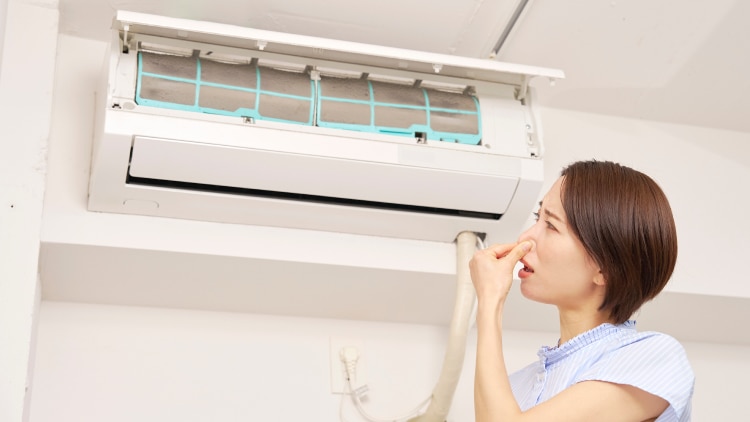

Air Conditioner Odor? Causes of Moldy Smell and Deodorization Methods
Why Does the Air Conditioner Produce Odors?
Air conditioners are essential appliances for maintaining indoor comfort. However, if not regularly maintained and cleaned, they can easily develop moldy, sour, or even foul odors, which not only affects air quality but may also trigger allergies or respiratory issues. In Hong Kong's humid climate, air conditioners are particularly prone to becoming breeding grounds for mold and bacteria. Therefore, understanding the causes of air conditioner odors and corresponding solutions is necessary knowledge for every household or office user.
Common Causes of Air Conditioner Odors
1. Accumulation of Dust and Moisture in Filters and Evaporators
If the filters and evaporators of the air conditioner are not cleaned regularly, they can accumulate dust and moisture. These conditions facilitate the growth of mold, mildew, and bacteria, which can spread through the airflow when the air conditioner operates, resulting in a noticeable moldy smell.
2. Clogged or Poorly Designed Drainage Pipes
When air conditioners operate, they produce condensate that is drained outside. If the drainage pipes are clogged or poorly designed, water can accumulate inside the unit, leading to the growth of bacteria and mold, which then produces foul odors.
3. Insects or Small Animals Entering the Air Conditioner
Some models of air conditioners have larger vents and pipes. If there are no protective grilles, small insects or even mice may accidentally enter and die inside the unit, releasing a strong foul odor as their bodies decompose.
4. Moist Environment Inside the Air Conditioner
Especially during seasonal transitions, when the frequency of air conditioner use is inconsistent, failing to properly dehumidify before turning off the unit can leave residual moisture inside, creating a breeding ground for mold.
5. External Environmental Factors
Odors from indoor smoking, cooking, using perfumes, or insecticides can be absorbed by the air conditioner and accumulate in the filters and internal metal components, eventually forming unpleasant odors.
Practical Methods to Resolve Air Conditioner Odors
1. Regularly Clean and Replace Filters
It is recommended to clean the filters every 2 weeks to 1 month and replace them annually. Choosing filters with antibacterial and antifungal properties can effectively prevent odor issues.
2. Use Air Conditioner-Specific Cleaners or Diluted Bleach
There are foam-type cleaners available specifically for air conditioners that can effectively clean the evaporator and fins. You can also carefully wipe the internal components with diluted bleach (1:99) to remove mold stains and odor sources.
3. Use High Fan Mode for Dehumidification
Running the fan mode for about 30-60 minutes can effectively expel moisture from inside the unit, reducing mold growth. It is advisable to perform this step every time before turning off the air conditioner.
4. Install a Check Valve
Installing a check valve at the air conditioner’s drainage outlet can effectively prevent the backflow of odors from the drainage pipe, especially for units connected to a sewer system.
5. Place Mold-Resistant Antibacterial Deodorizing Stickers
There are mold-resistant antibacterial stickers specifically designed for air conditioners that can be placed at the air outlet. They utilize beneficial bacteria to decompose sources of odor, maintaining a fresh scent for about 2-3 months.
6. Seek Professional Air Conditioner Cleaning Services
If the air conditioner has not been cleaned for a long time or if the odor is severe, it is advisable to hire professional technicians for a thorough disassembly and cleaning, including internal fins, blowers, and drainage systems, to ensure complete cleanliness.
Daily Maintenance Suggestions to Prevent Moldy Smells
- Clean the filters at least once a month using a neutral cleaner and let them dry
- Check the drainage pipes for blockages every season to prevent water accumulation
- After each use, run the fan mode for 15-30 minutes to keep the interior dry
- Avoid smoking and using heavily scented products indoors to reduce the risk of odor accumulation
- Arrange for a professional deep cleaning of the air conditioner once a year to prevent mold and odors
Neglecting the cleaning and maintenance of air conditioners can lead to the development of odors and mold, reduce cooling efficiency, shorten lifespan, and even impact human health. By understanding the causes of odors and the solutions presented in this article, readers can systematically maintain their air conditioning equipment, creating a comfortable and clean environment for home and office spaces.
Air Conditioner Odors Q&A
Q: Why does my air conditioner smell moldy when I turn it on?
A: This is mainly due to the filters, evaporators, or drainage pipes being uncleaned for a long time, leading to the accumulation of moisture and dust, which causes mold growth. Cleaning the filters and using the dehumidification function can help improve this.
Q: Can I clean the air conditioner myself to resolve the odor?
A: If the odor is mild, you can address it by replacing the filters and using specialized cleaners or diluted bleach. However, if the smell is severe or there are unusual noises, it is advisable to seek professional assistance.
Q: How often should I clean my air conditioner?
A: It is generally recommended to clean the filters at least once a month and to have a professional deep cleaning done once a year to ensure the efficiency and hygiene of the air conditioner.
Q: Are deodorizing stickers really effective?
A: Most air conditioner deodorizing stickers combine beneficial bacteria or active ingredients that can decompose odor sources, showing significant effects for mild odors, but they cannot completely replace regular cleaning and maintenance.
Q: How can I prevent my air conditioner from developing odors again?
A: Regularly cleaning the filters, ensuring the drainage pipes are clear, running the fan mode for dehumidification before turning off the unit, and maintaining indoor ventilation and dryness are effective methods to prevent odors.

